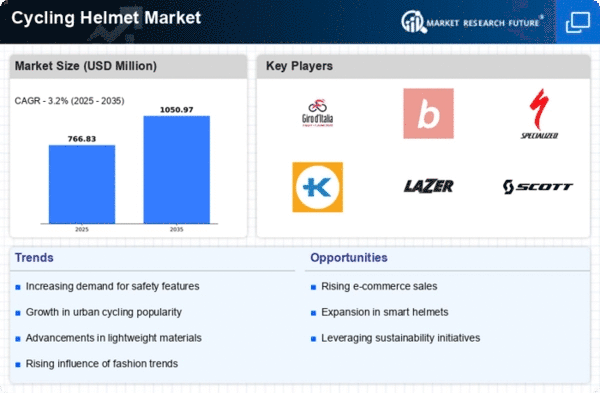Top Industry Leaders in the Cycling Helmet Market
 Global Cycling Helmet Market Overview
Global Cycling Helmet Market Overview
The competitive landscape of the cycling helmet market is a dynamic and evolving space driven by the increasing awareness of safety among cyclists and the growing popularity of cycling as a recreational and fitness activity. The market is characterized by a mix of established players, innovative newcomers, and strategic partnerships.
Key players in the cycling helmet market
- Polisport Plásticos SA (Portugal)
- Vista Outdoor Operations LLC (US)
- Specialized Bicycle Components (US)
- Dorel Sports (Canada)
- Uvex Sports (Germany)
- Trek Bicycle Corporation (US)
- MET-Helmets (Italy)
- Limar Srl (Italy)
- Orbea (Spain)
- SCOTT Sports SA. (Switzerland)
- KASK S.p.a. (Italy)
- Merida & Centurion Germany GmbH (Germany)
- Giant Manufacturing Co., Ltd (China)
- Amer Sports (Finland)
- POC Sweden AB (Sweden)
- Urge Bike Products (France)
- LAS helmets (Italy)
Market share analysis in the cycling helmet industry is influenced by various factors, including product innovation, brand reputation, pricing strategies, and distribution networks. Established players leverage their brand recognition and economies of scale to maintain a competitive edge. However, emerging companies often focus on niche markets, introducing unique features or catering to specific consumer segments. In recent years, factors such as increased emphasis on sustainable and eco-friendly materials have also played a role in shaping consumer preferences and impacting market share.
New and emerging companies in the cycling helmet market are introducing disruptive technologies and designs to challenge the status quo. Start-ups like Lumos Helmet have gained attention with their integration of smart features, such as built-in lights and turn signals, enhancing visibility and safety for cyclists. These companies leverage crowdfunding platforms and direct-to-consumer models to establish a foothold in the market, capitalizing on the demand for innovation and differentiation.
Industry news reflects ongoing developments in the cycling helmet market, with a focus on safety standards, regulatory changes, and technological advancements. Continuous efforts by regulatory bodies to enhance safety standards and testing protocols have a significant impact on the market dynamics. For instance, the adoption of stricter testing criteria for impact resistance and helmet fit has prompted manufacturers to invest in advanced materials and design technologies.
Current company investment trends in the cycling helmet market highlight the growing importance of sustainability and environmental responsibility. Manufacturers are increasingly exploring eco-friendly materials, such as recycled plastics and bio-based composites, to align with consumer preferences for sustainable products. Investments in research and development are also directed towards improving the recyclability of helmets, addressing the environmental concerns associated with product disposal.
The overall competitive scenario in the cycling helmet market is marked by a balance between established players maintaining market share and innovative newcomers disrupting the industry with novel approaches. Partnerships and collaborations, both within and outside the industry, play a crucial role in shaping the competitive landscape. For example, collaborations between helmet manufacturers and technology companies aim to integrate smart features, enhancing the overall functionality of cycling helmets.
The cycling helmet market, ever-evolving like a well-oiled chainset, continues to witness a flurry of exciting developments. Here's a snapshot of the most recent trends shaping the terrain:
Recent Development News
Tech Takes the Lead:
Smart helmets: Gone are the days of passive protection. Smart helmets like Lumos Matrix and LIVALL Halo integrate LED lights, turn signals, and even crash detection, offering enhanced visibility and safety.
AI-powered impact assessment: Companies like Bontrager are developing helmets embedded with AI algorithms that analyze impact forces and suggest follow-up actions, potentially revolutionizing post-crash care.
Augmented reality (AR): Imagine navigating your route or monitoring vital signs through your helmet visor. Startups like Skully AR are making this a reality, blurring the lines between headgear and heads-up displays.










